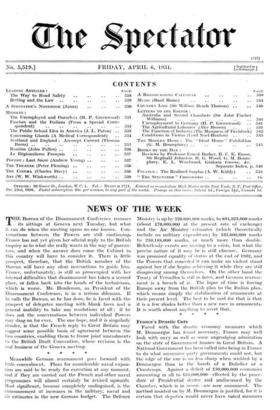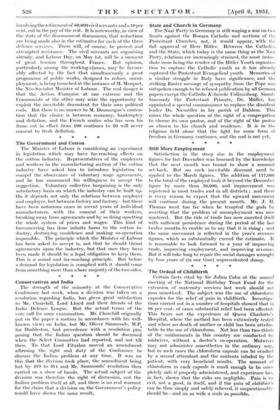France's Drastic Cuts Faced with the drastic economy measures which
M. Doumergue has found necessary, France may well look with envy as well as some ungrudging admiration on the state of Government finance in Great Britain. A National Government has been called into being in France to do what successive party governments could not, but the edge of the axe is no less sharp, when wielded by a Doumergue than in the hands of a Daladier or a Chautemps. Against a deficit of £50,000,000 economies amounting in all to £34,000,000—effeeted by the proce- dure of Presidential decree and undiseussed by the Chamber, which is in recess—are now announced. The 'method- insisted on by M. Dournergue is justified, for it is certain that deputies would never have voted measures involving the retirement of 80,000 civil servants and a 10 per cent. cut in the pay of the rest. It is noteworthy, in view of the state of the disarmament discussions, that reductions are being made also in the estimates for each of the three defence services. There will, of course, be protest and attempted resistance. The civil servants are organising already, and Labour Day, on May 1st, will be a moment of great tension throughout France. But opinion, particularly among the working-classes, may be favour- ably affected by the fact that simultaneously a great programme of public works, designed to reduce unem- ployment, is being launched at the instance of M. Marquet, the Neo-Socialist Minister of Labour. The real danger is that the Action Francaise at one extreme and the ,Communists at the other may seize the opportunity to exploit the inevitable discontent for their own political ends. But there is no answer to M. Doumergue's conten- tion that the choice is between economy, bankruptcy • and deflation, and the French rentier who has seen his franc cut in effect from 100 centimes to 20 will never consent to fresh deflation.









































